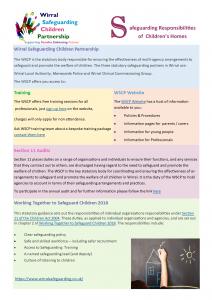Safeguarding Responsibilities of Children’s Homes
Wirral Safeguarding Children Partnership
The WSCP is the statutory body responsible for ensuring the effectiveness of multi-agency arrangements to safeguard and promote the welfare of children. The three statutory safeguarding partners in Wirral are: Wirral Local Authority, Merseyside Police and Wirral Clinical Commissioning Group.
The three safeguarding partners are committed to providing a safeguarding system in Wirral where:
- excellent practice is the norm, and can be seen in common across services
- partner agencies hold one another to account effectively, and improvement
- results there is early identification of, and co-owned action on ‘new’ safeguarding issues
- learning is promoted and embedded, and its effects can be proven
- information is shared effectively and translates into knowledge that informs practice
- the public are engaged in safeguarding all children and feel confident that children are protected from harm
Working Together to Safeguard Children 2018
This statutory guidance sets out the responsibilities of individual organisations responsibilities under Section 11 of the Children Act 2004. These duties, as applied to individual organisations and agencies, and are set out in chapter 2 of Working Together to Safeguard Children 2018. The responsibilities include:
- Clear safeguarding policy
- Culture of listening to children
- Safe and skilled workforce – including safer recruitment
- A named safeguarding lead (and deputy)
- Access to Safeguarding Training
Click on the flyer below to download and display in your organisation
Section 11 / 175 Audit
The WSCP is the key statutory body for coordinating and ensuring the effectiveness of arrangements to safeguard and promote the welfare of all children in Wirral. It is the duty of the WSCP to hold agencies to account in terms of their safeguarding arrangements and practices.
The WSCP uses a variety of ways to test the strength of safeguarding arrangements across agencies in Wirral but one of the key ways is by the use of an annual safeguarding audit called the Section 11 Audit (for agencies). Section 11 was issued under the Children Act (2004) and has been reinforced in Working Together to Safeguard Children 2018.
Section 11 places a duty on a range of organisations and individuals to ensure their functions, and any services that they contract out to others, are discharged having regard to the need to safeguard and promote the welfare of children including:
- a clear line of accountability for the commissioning and/or provision of services designed to safeguard and promote the welfare of children
- a senior board level lead with the required knowledge, skills and expertise or sufficiently qualified and experienced to take leadership responsibility for the organisation’s/agency’s safeguarding arrangements
- a culture of listening to children and taking account of their wishes and feelings, both in individual decisions and the development of services
- clear whistleblowing procedures, which reflect the principles in Sir Robert Francis’ Freedom to Speak Up Review and are suitably referenced in staff training and codes of conduct, and a culture that enables issues about safeguarding and promoting the welfare of children to be addressed
- clear escalation policies for staff to follow when their child safeguarding concerns are not being addressed within their organisation or by other agencies
- arrangements which set out clearly the processes for sharing information, with other practitioners and with safeguarding partners
- a designated practitioner (or, for health commissioning and health provider organisations/agencies, designated and named practitioners) for child safeguarding. Their role is to support other practitioners in their organisations and agencies to recognise the needs of children, including protection from possible abuse or neglect. Designated practitioner roles should always be explicitly defined in job descriptions. Practitioners should be given sufficient time, funding, supervision and support to fulfil their child welfare and safeguarding responsibilities effectively
- safe recruitment practices and ongoing safe working practices for individuals whom the organisation or agency permit to work regularly with children, including policies on when to obtain a criminal record check
- appropriate supervision and support for staff, including undertaking safeguarding training
- creating a culture of safety, equality and protection within the services they provide
In addition:
- employers are responsible for ensuring that their staff are competent to carry out their responsibilities for safeguarding and promoting the welfare of children and creating an environment where staff feel able to raise concerns and feel supported in their safeguarding role
- staff should be given a mandatory induction, which includes familiarisation with child protection responsibilities and the procedures to be followed if anyone has any concerns about a child’s safety or welfare
- all practitioners should have regular reviews of their own practice to ensure they have knowledge, skills and expertise that improve over time
To participate in the annual audit and for further information please follow the link here
Children’s Homes
- The registered person of a children’s home must have regard to the Guide to the Children’s Homes Regulations, including quality standards (April 2015), in interpreting and meeting the Regulations. The Guide covers the quality standards for children’s homes, which set out the aspirational and positive outcomes that we expect homes to achieve, including the standard for the protection of children. The registered person is responsible for ensuring that staff continually and actively assess the risks to each child and the arrangements in place to protect them. Where there are safeguarding concerns for a child, their placement plan, agreed between the home and their placing authority, must include details of the steps the home will take to manage any assessed risks on a day to day basis.
- In addition to the requirements of this standard, the registered person has specific responsibilities under regulation 34 to prepare and implement policies setting out: arrangements for the safeguarding of children from abuse or neglect; clear procedures for referring child protection concerns to the placing authority or local authority where the home is situated if appropriate; and specific procedures to prevent children going missing and take action if they do.
- Each home should work with their local safeguarding partners to agree how they will work together, and with the placing authority, to make sure that the needs of the individual children are met.
About the Quality Standards
The Regulations set out standards (“the Quality Standards”) that must be met by homes. The Quality Standards describe outcomes that each child must be supported to achieve while living in the children’s home. Each contains an over-arching, aspirational, child-focused outcome statement, followed by a non-exhaustive set of underpinning, measurable requirements that homes must achieve in meeting each standard.
The Regulations prescribe nine Quality Standards which must be met by children’s homes:
- The quality and purpose of care standard (see regulation 6)
- The children’s views, wishes and feelings standard (see regulation 7)
- The education standard (see regulation 8)
- The enjoyment and achievement standard (see regulation 9)
- The health and well-being standard (see regulation 10)
- The positive relationships standard (see regulation 11)
- The protection of children standard (see regulation 12)
- The leadership and management standard (see regulation 13)
- The care planning standard (see regulation 14)
Collectively these nine standards are the Quality Standards. They are referred to individually in this Guide to the Children’s Homes Regulations including the quality standards as “the education standard”, and so on. Regulation 5 is overarching; meaning is it relevant across all the Quality Standards. It sets out the requirement that children’s homes must seek to work with those in the wider system to ensure that each child’s needs are met.
How Wirral Safeguarding Children Partnership can Support your Organisation
Wirral Safeguarding Children Partnership is keen to support all Children’s Homes to provide a safe environment in which children can flourish. You can get further advice by visiting the WSCP website here
We are also on hand to discuss your training requirements and can offer bespoke courses (at cost) to support organisations if required. Email the training team to discuss your requirements.


